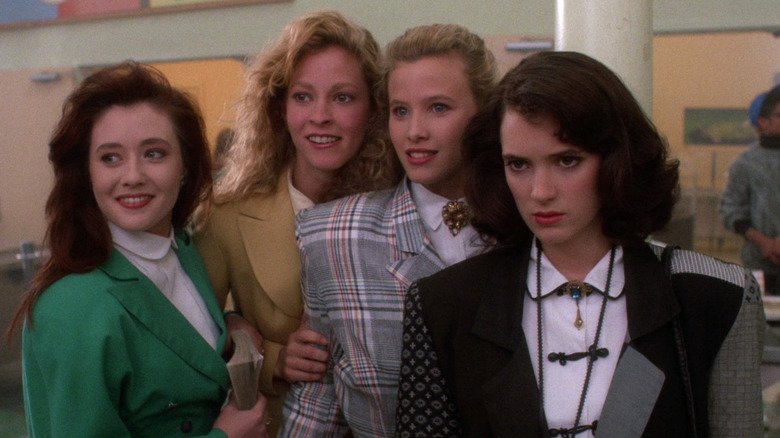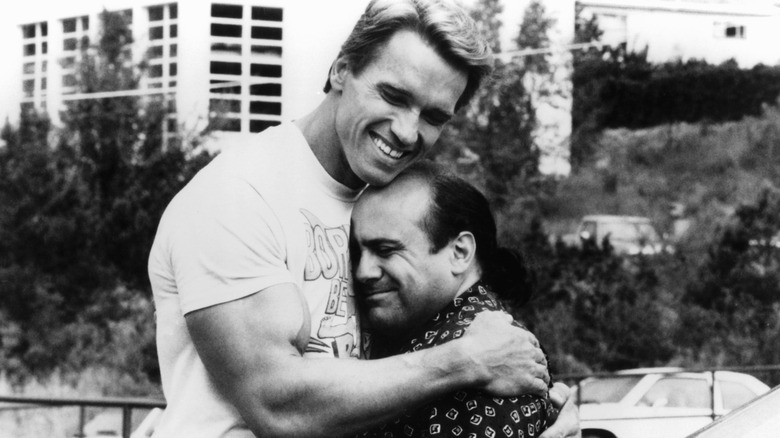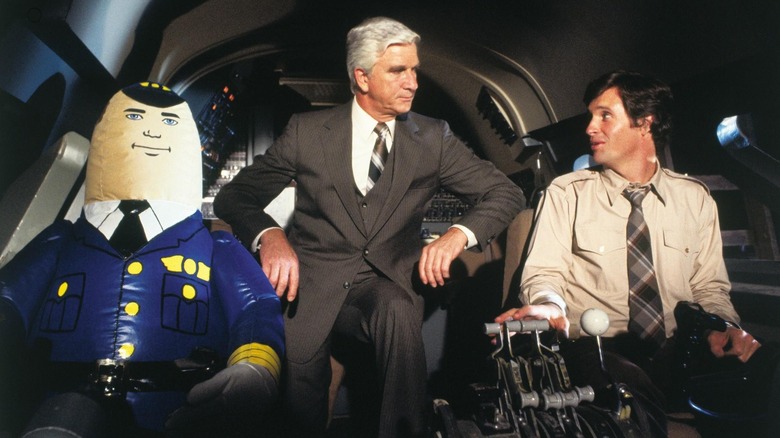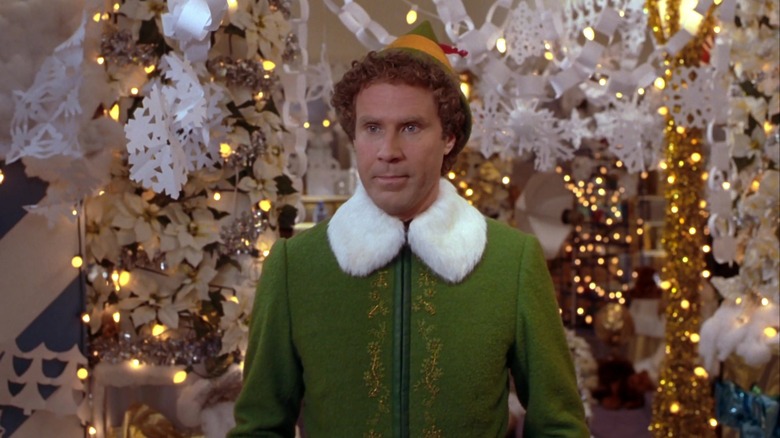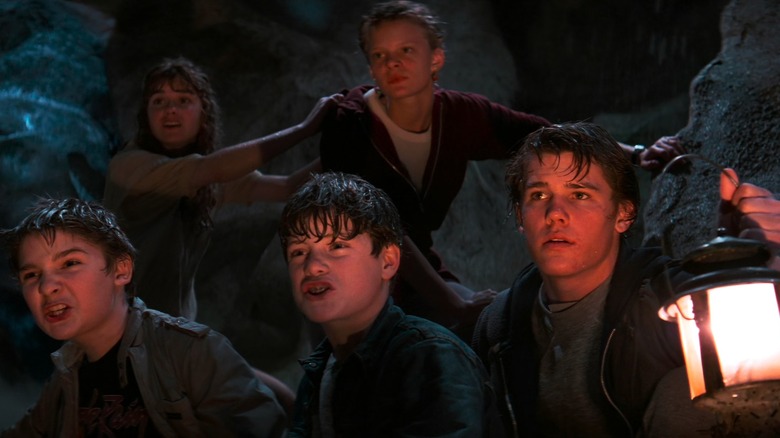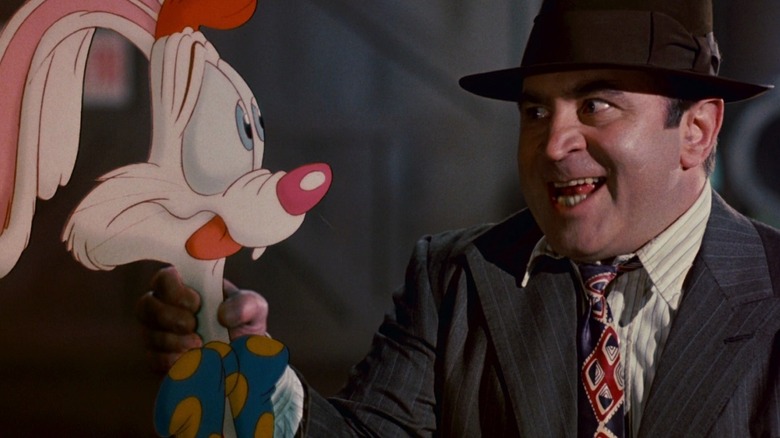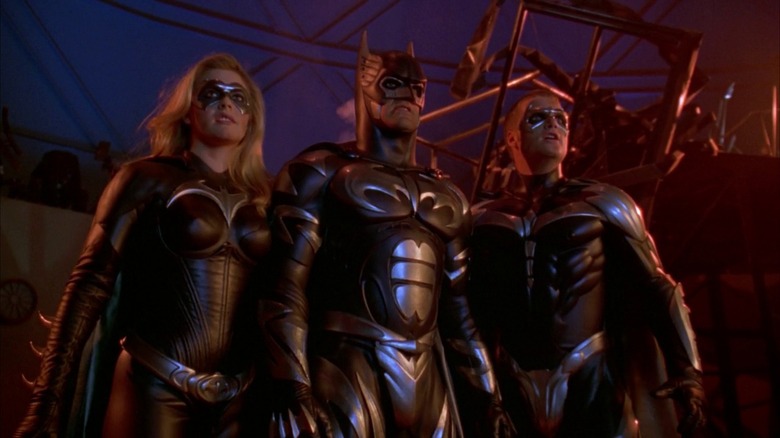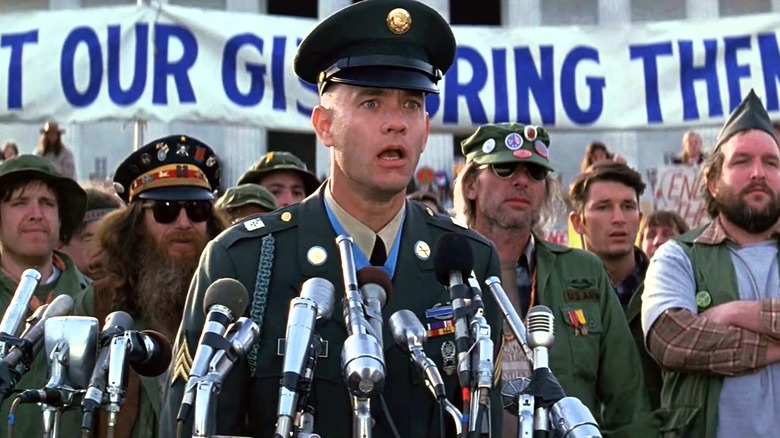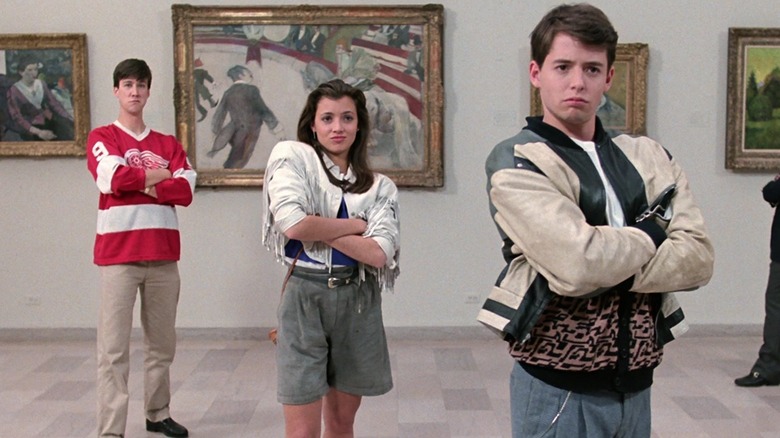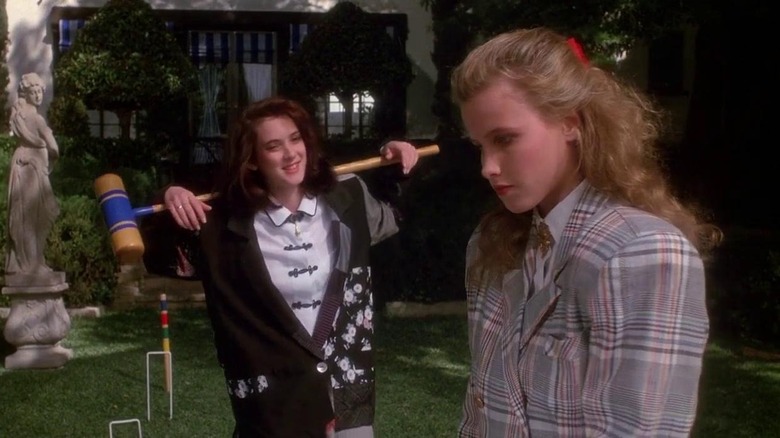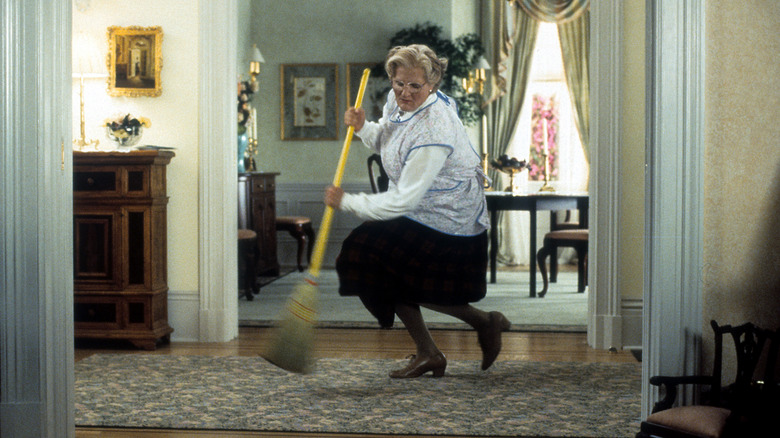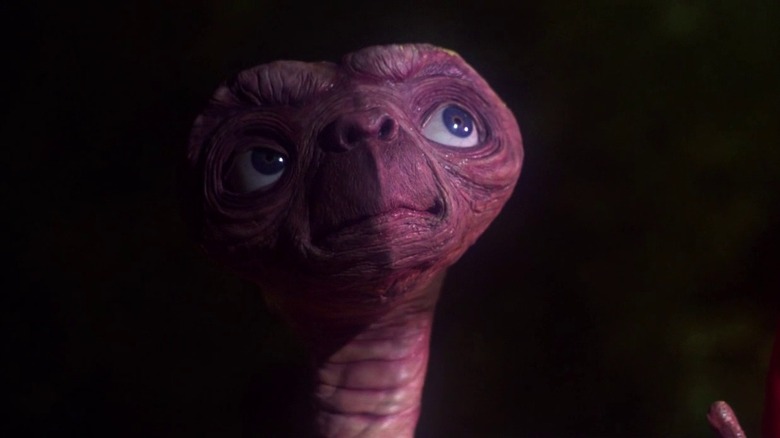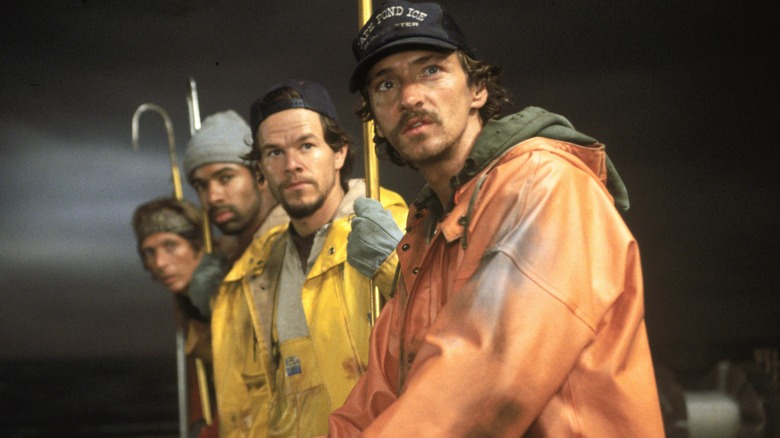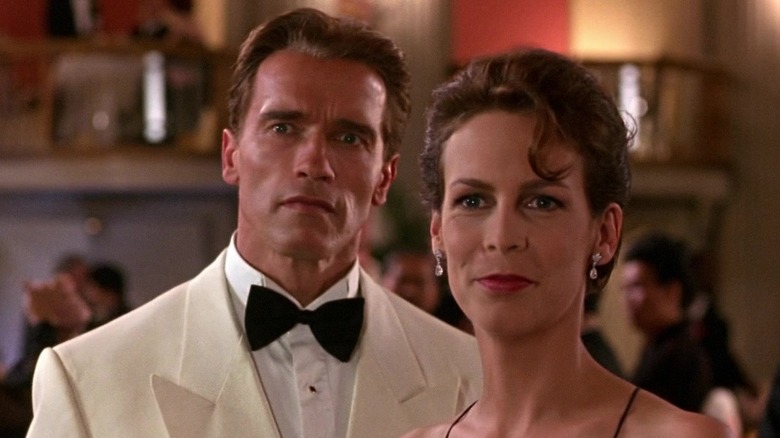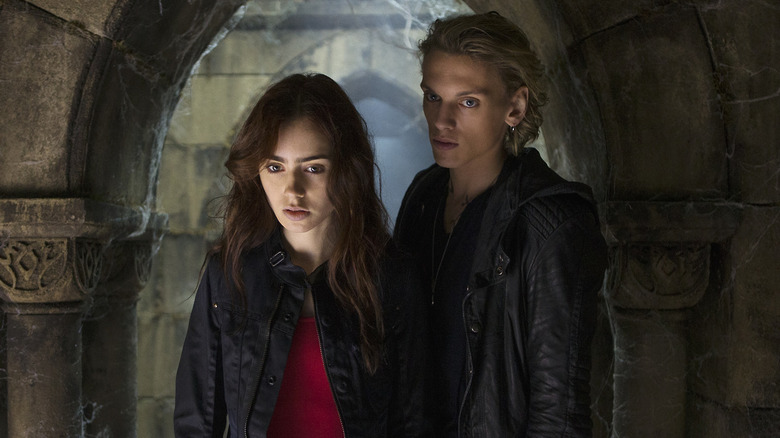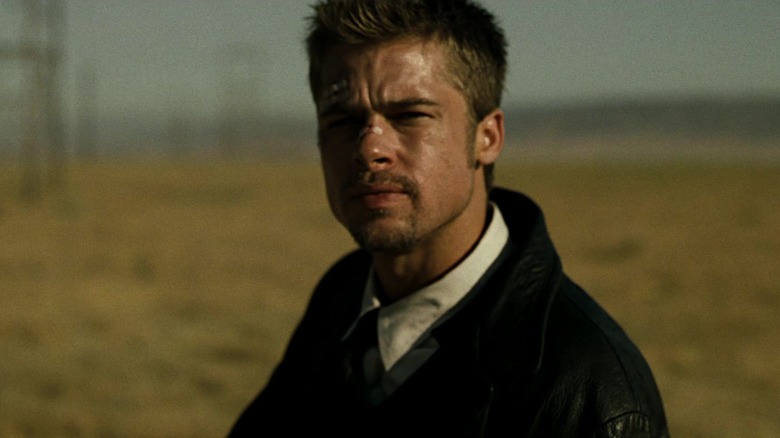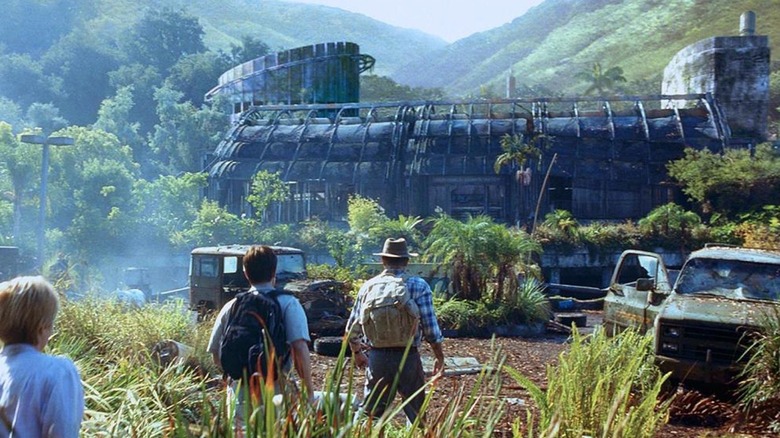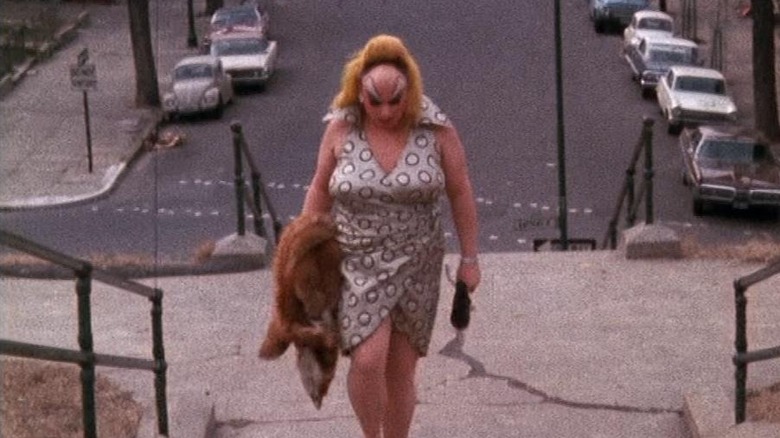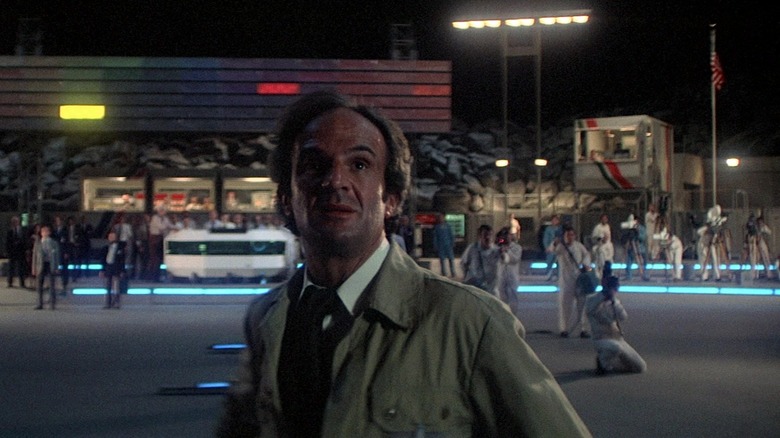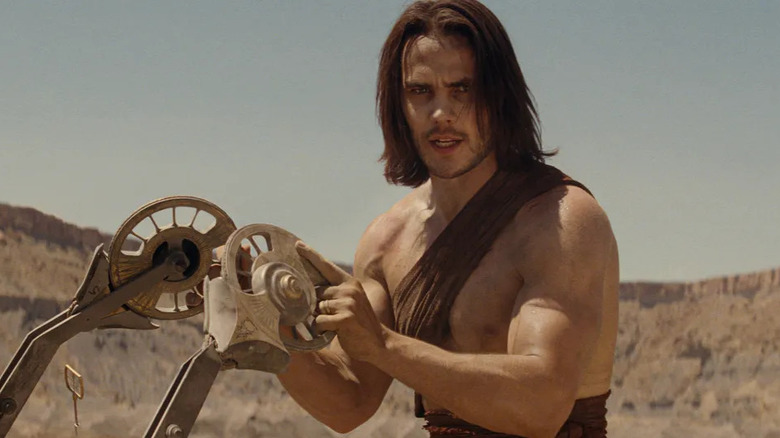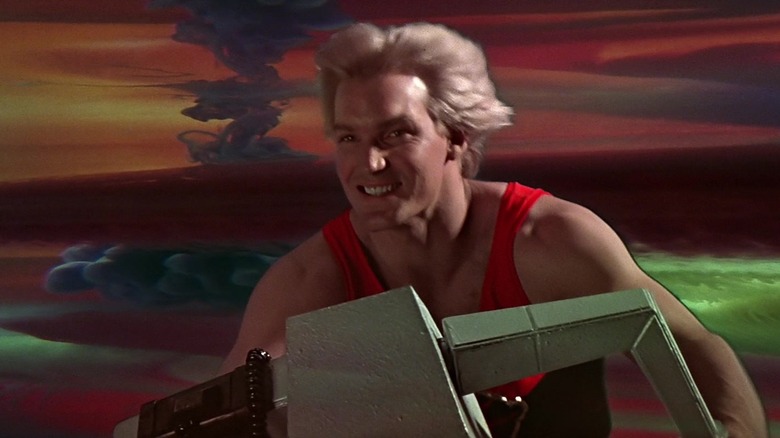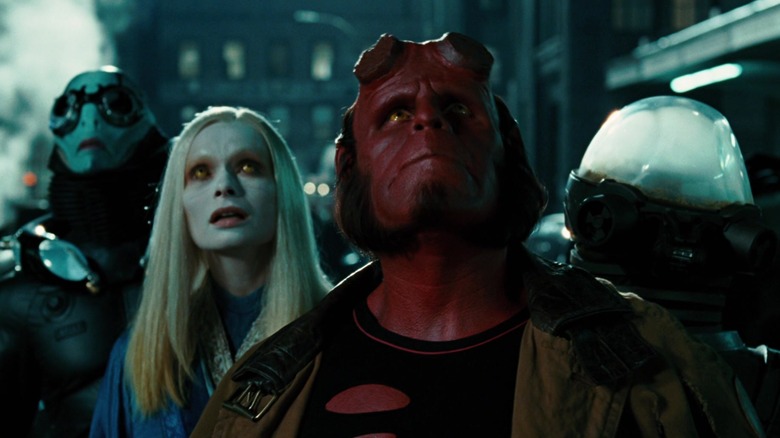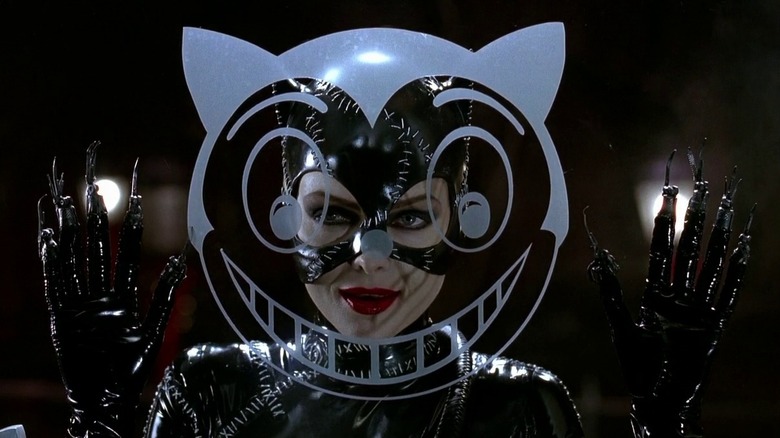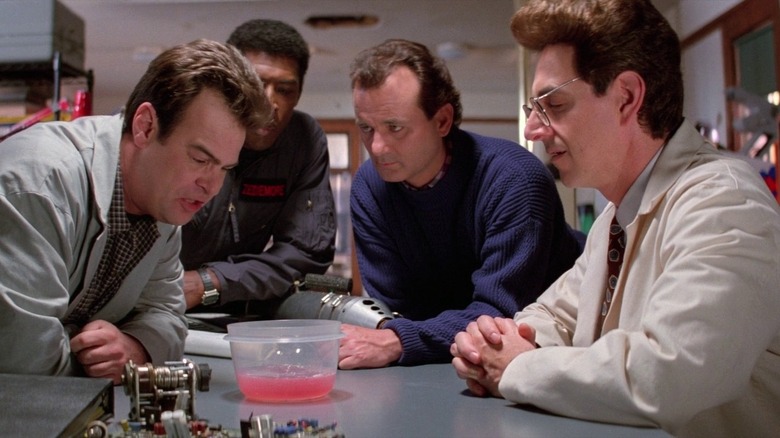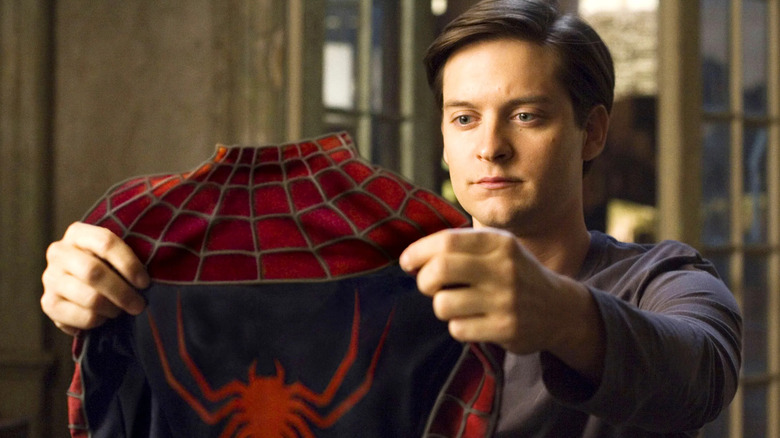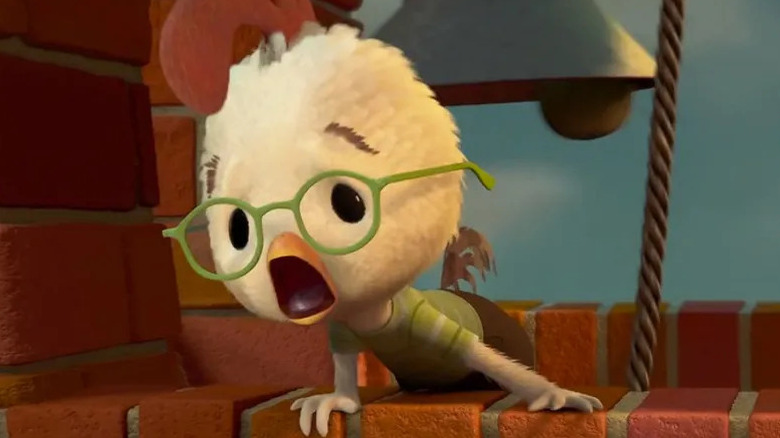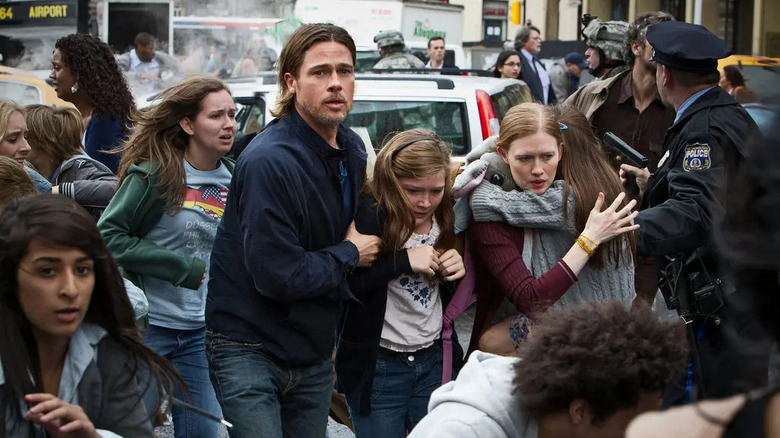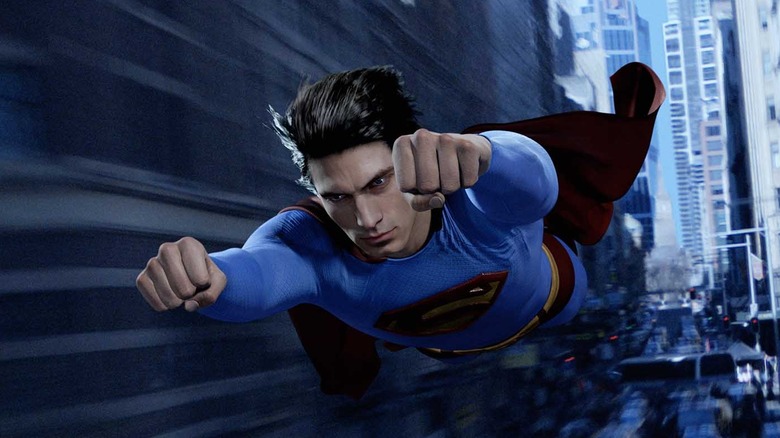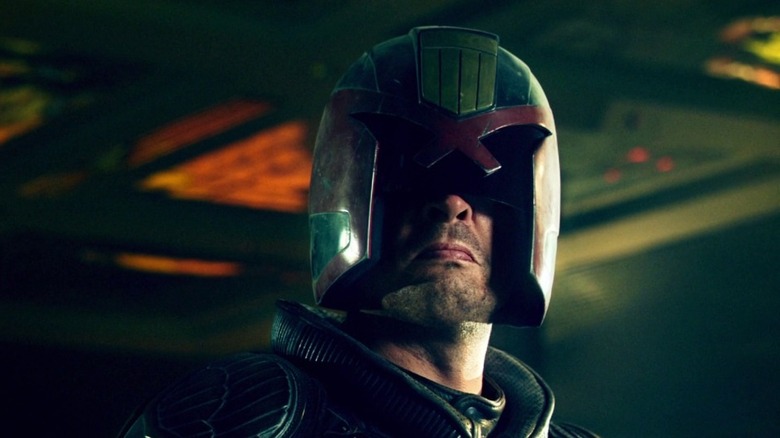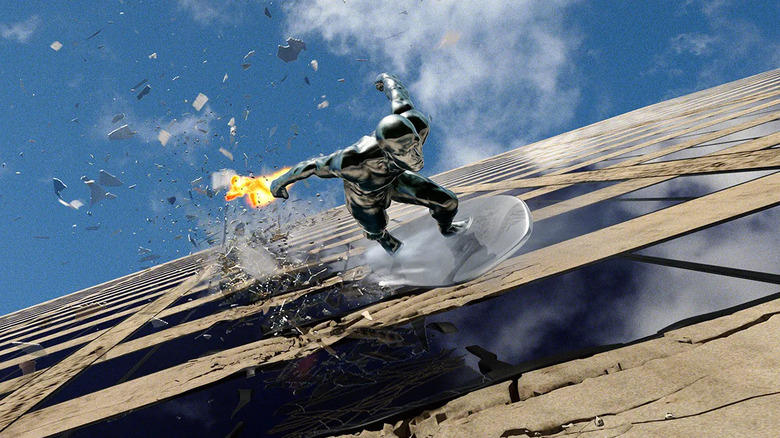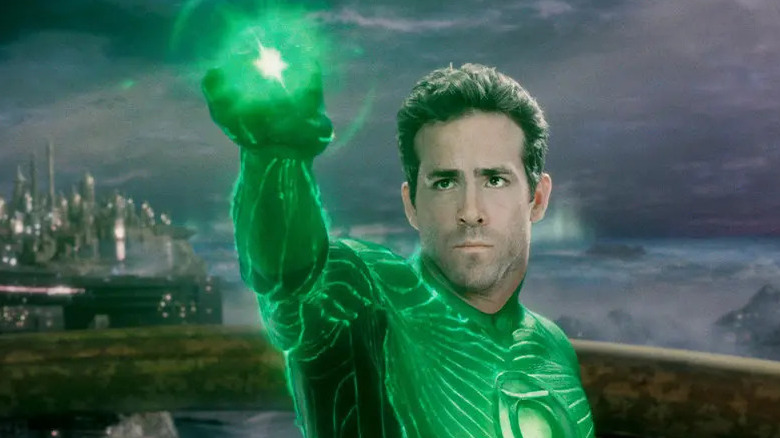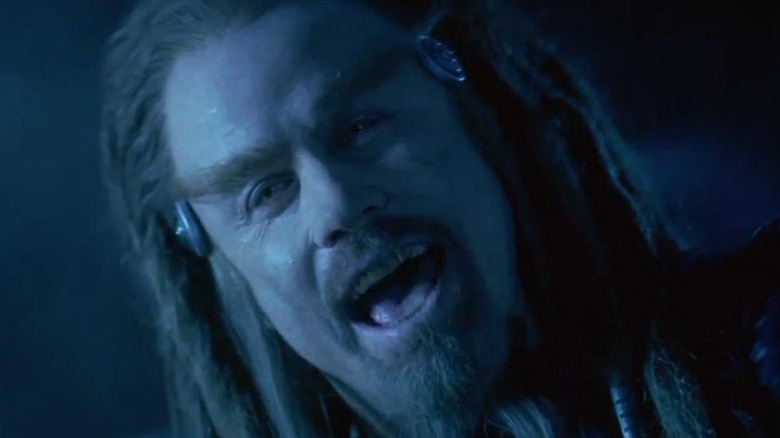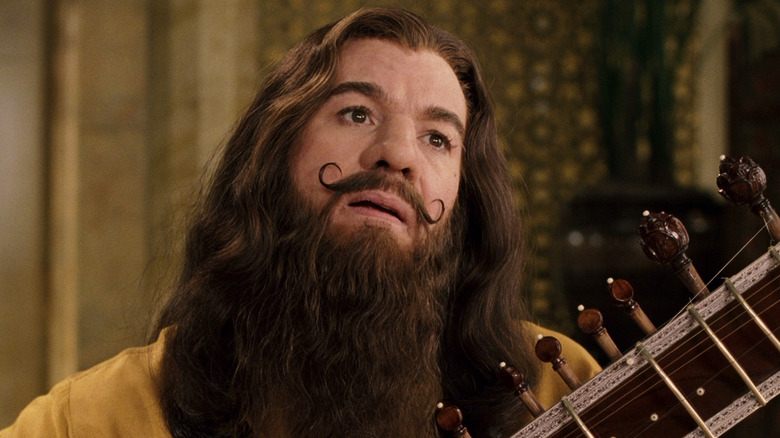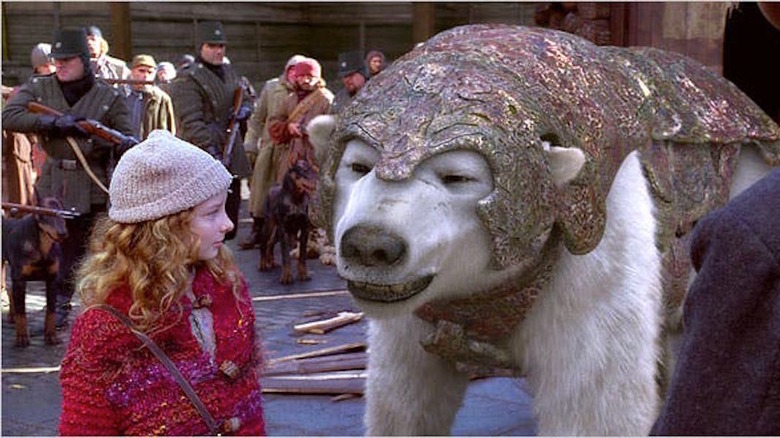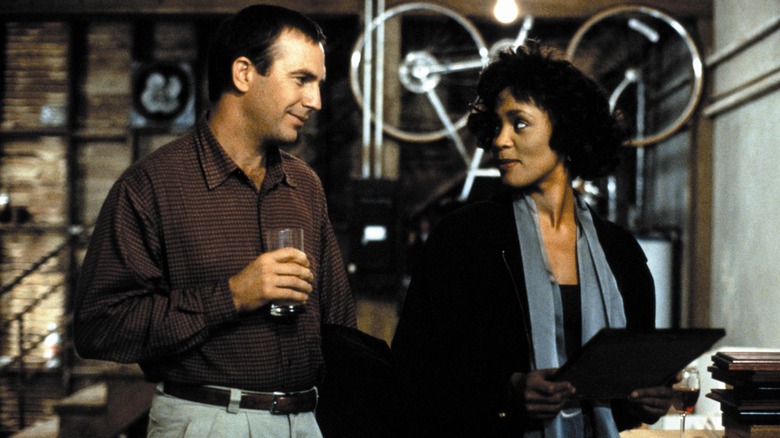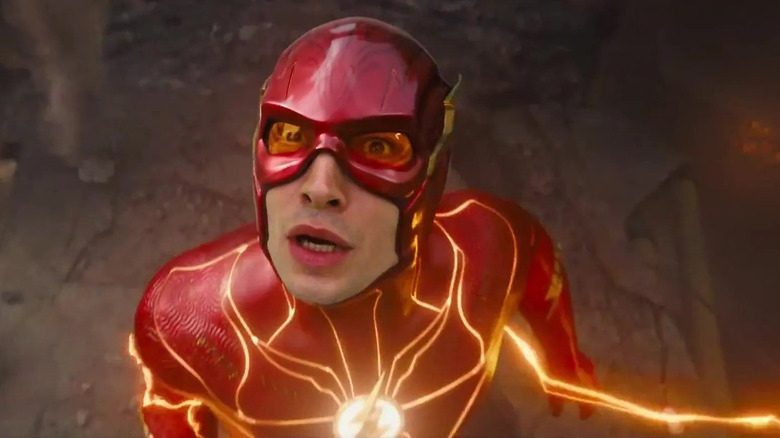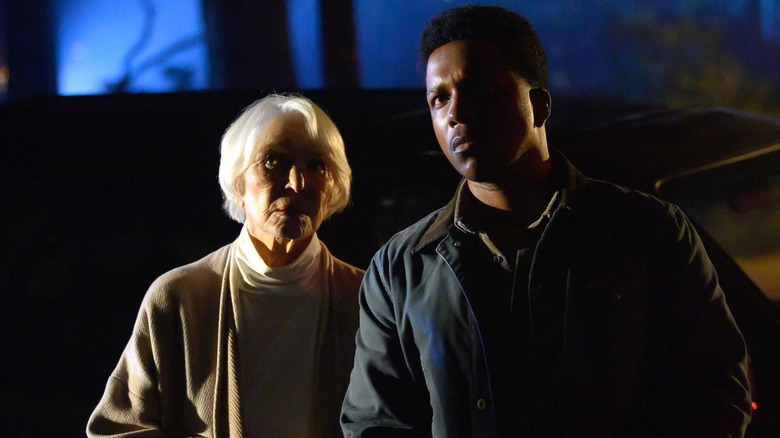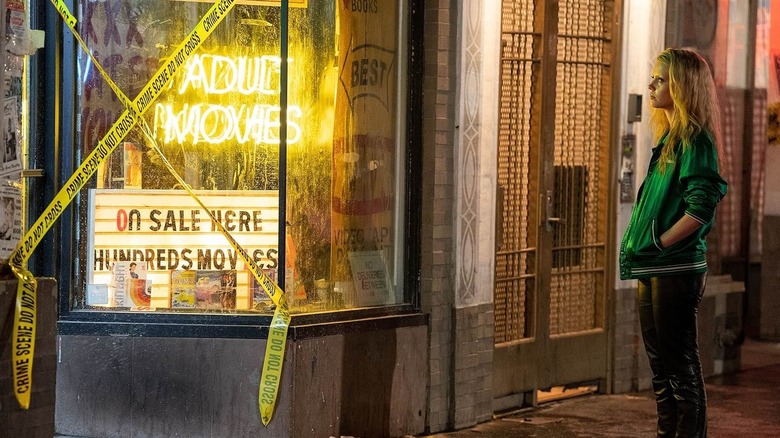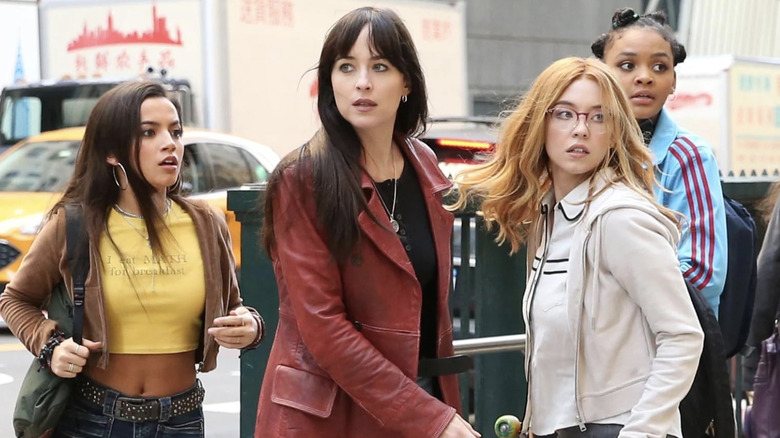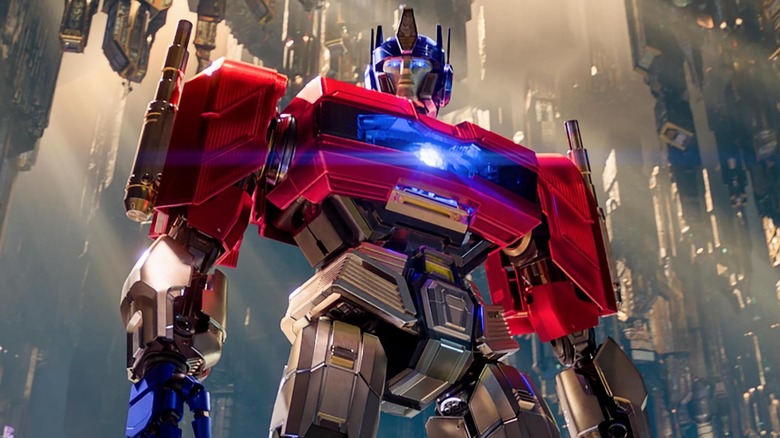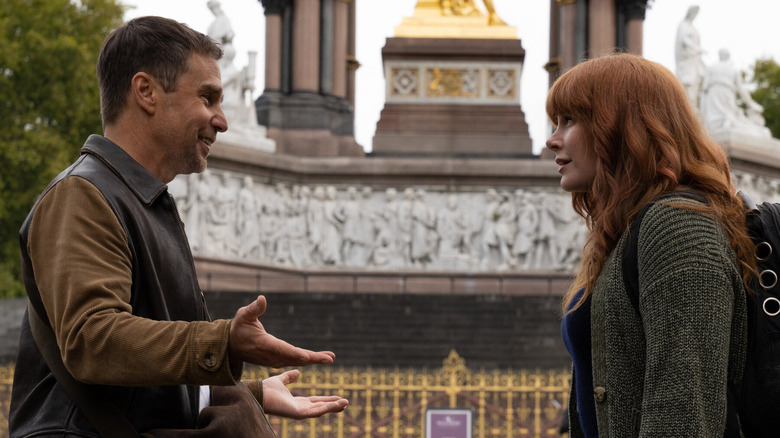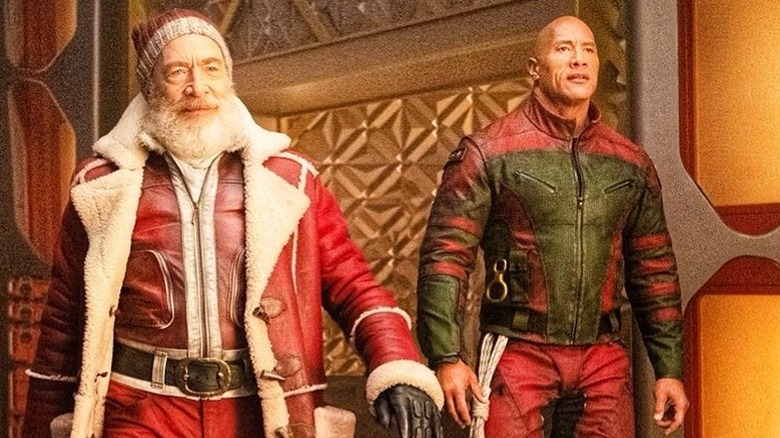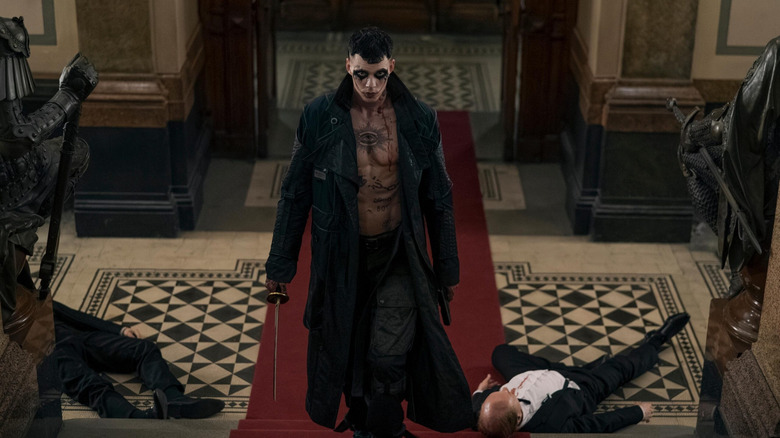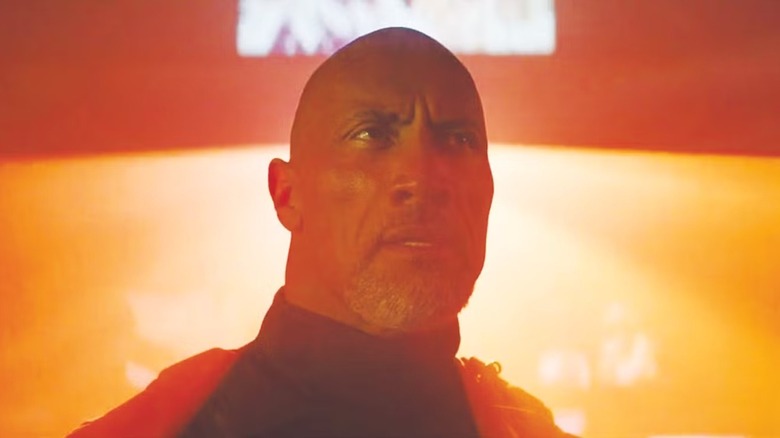Planned Sequels That Were Completely Abandoned
Sequels are a big business in Hollywood, and every studio loves a franchise. When filmmakers board a project, it's not uncommon for them to have two or three sequels mapped out already — just in case the first film is a runaway hit. Still, sometimes a movie just can't pass that initial bar of quality that gets a sequel greenlit in the first place. Filmmakers might have grand plans for a franchise, only to have them thwarted by lousy reviews and low box office receipts.
Some dropped sequels are ones no one ever asked for to begin with ("Battlefield Earth 2," anyone?), but many don't happen due to actor disagreements, director woes, production problems, or plain, old-fashioned money trouble. Of course, that doesn't stop us from wishing we could see some of these unrealized visions of follow-ups to some of our favorite movies. Here are some sequels that, for one reason or another, were abandoned.
Twins 2: Triplets
"Twins" is something of a high-concept comedy that revolves entirely around a sight gag: muscle-laden Austrian superman Arnold Schwarzenegger and diminutive Brooklynite Danny DeVito play long-lost twins. The 1988 hit (directed by "Ghostbusters" mastermind Ivan Reitman) was a breezy romp in which the two huge stars palled around and goofed off under the auspice of their characters getting to know each other.
Because "Twins" was such a hit, rumors abounded almost immediately after its release that a sequel was imminent. In 1989, a representative for Reitman said that the director was considering making a movie called — what else — "Triplets." The candidate to play the third long-lost multiple who doesn't look anything like the others was the hottest comedy star of the moment, Roseanne Barr. That movie never got made of course, but in 2012, there was renewed talk of "Triplets," without Barr but with Eddie Murphy instead. That was about five years ago, and there's been no development on the movie since.
Airplane III
There are literally thousands of jokes in the two "Airplane!" movies (we counted), but there was one hidden gem in 1982's "Airplane II: The Sequel" that was totally legitimate: at the very end of the movie is a brief teaser for "Airplane III." It might have seemed like the filmmakers were kidding (similar to Mel Brooks' fake preview of "The History of the World, Part 2" at the end of "The History of the World, Part 1"), but it was really in the works, with most of the creative crew and cast on board for another flight.
The major holdout was Ted Striker himself, star Robert Hays. He later told Den of Geek that in the early '80s, actors who did sequels were "looked down upon" and he was afraid if he did one more, he'd be typecast, so he passed. Hays went on to star in the short-lived TV version of "Starman" instead, while "Airplane!" writer-directors David Zucker, Jim Abrahams, and Jerry Zucker enjoyed further spoofy success with the "Airplane!"-esque "Naked Gun" movies.
Elf 2
2003 is the year Will Ferrell became an A-list star. Early that year, he starred as Frank the Tank in "Old School," and he finished it out by breathing holiday magic into the role of Buddy the Elf in the modern Christmas classic "Elf." It would be disastrous for anybody else to play Buddy—witness the lackluster performance of a 2014 animated "Elf" special in which Buddy was voiced by "The Big Bang Theory" star Jim Parsons. In other words, no Ferrell, no "Elf 2." But boy, did Hollywood try.
Ferrell turned down a whopping $29 million to reprise his role. "I killed the idea of a sequel," Ferrell told The Guardian. "I remember asking myself: could I withstand the criticism when it's bad and they say, 'He did the sequel for the money?' I decided I wouldn't be able to." Ferrell was still fielding questions about more "Elf" movies in 2013, when he did star in a sequel, "Anchorman 2." He reiterated that he wasn't interested: "I just think it would look slightly pathetic if I tried to squeeze back in the elf tights."
The Goonies 2
The possibility of "The Goonies 2" has been bandied about for at least a decade. In 2005, Jeff Cohen (Chunk) said that "Goonies" producer Steven Spielberg had told him he had an idea for a sequel, but that studio Warner Bros. wasn't interested. Two years later, Sean Astin (Mikey) told MTV that Spielberg and director Richard Donner were considering doing a reboot, with a new batch of kid actors as a new generation of Goonies. Then in 2008, Corey Feldman (Mouth) said that a "Goonies 2" would not be happening. But then in 2014, Donner said a sequel with the original cast was in the works.
So many rumors ... so little to show for it. As recently as 2016, Astin told a crowd at Phoenix Comicon that "The Goonies 2" was back on, and that it would be about the original Goonies and their kids, and that they'd square off with the pirate One-Eyed Willy. But not so fast — just a few weeks later, Feldman delivered a dose of reality (via MovieWeb): "Richard Donner is 87 years old. And it's like, no one really wants to make it without him ... When you get to that age, things slow down quite a bit. There is a big possibility that he might not want to keep driving it. So, I think without him, it doesn't happen. And every day that passes, that he doesn't do it, there is less and less chance that it is ever going to happen at all."
Who Framed Roger Rabbit 2
It may seem like even the marginally successful animated movies get sequels — such is the cash bonanza of making family-friendly films. That's why it's incredibly surprising that "Who Framed Roger Rabbit?" never got a follow-up. It earned $156 million at the box office in 1988 — which at the time made it the highest-grossing animated movie (or half-animated, half-live action movie) ever.
This is not to say that director Robert Zemeckis didn't have a lot of ideas for a second installment. While the first film was a send-up of 1940s film noir (among other things), the next movie was to be set amidst the world of 1950s films. He also wasn't the first (or the last) to try to bring Roger Rabbit back to the big screen. In 1989, 16-year-old J.J. Abrams worked on an outline for a sequel. Producers also discussed a prequel to the original movie in which Roger Rabbit fights the Nazis during World War II. But in the end, the property is controlled by Disney, whom Zemeckis says, via Cinemablend, "has no interest in Roger, and they certainly don't like Jessica at all." (Apparently, the vampy vixen is just a little too family-unfriendly for the House of Mouse.)
Batman Triumphant
George Clooney's first outing as the Caped Crusader in 1997's "Batman & Robin" was not supposed to be his last. In fact, Warner Bros. was gearing up to bring back Clooney and co-stars Chris O'Donnell and Alicia Silverstone for a sequel titled "Batman Triumphant," which would have been directed by "Batman & Robin" and "Batman Forever" filmmaker Joel Schumacher. However, "Batman & Robin" was a critical joke, summoning more laughs than its humorous script ever intended to, and audiences who'd flocked to watch Val Kilmer sit behind the Batmobile wheel just two years before simply did not show up to see what Uma Thurman's Poison Ivy and Arnold Schwarzenegger's Mr. Freeze would be adding to the villainous fold this go-round (spoiler: they didn't miss much).
"Batman Triumphant" was originally given the green light by the studio while "Batman & Robin" was still mid-production because, somehow, whatever dailies the execs laid eyes on at the time impressed them enough to think a follow-up was in short order — until the movie came out. If "Batman Triumphant" had come to fruition, it would've ushered in the Scarecrow and Harley Quinn (as the Joker's daughter, rather than lover, in this version) as the new do-badders du jour, and they would've been joined by the Joker, Penguin, Catwoman, Two-Face, and The Riddler in an effort to get Bruce Wayne committed to Arkham Asylum.
Clooney, for one, stepped away from superheroism for good after the first film proved to be such a dud and apologized to fans for being any part of it, later admitting, "Let me just say that I'd actually thought I'd destroyed the franchise until somebody else brought it back years later and changed it." That person, of course, Christopher Nolan, who launched his critically acclaimed Dark Knight Trilogy with 2005's "Batman Begins" — and Christian Bale beneath the cowl.
Forrest Gump 2
The historically flavored journey of Forrest Gump (Tom Hanks) and his lifelong love Jenny earned almost $700 million worldwide on a $55 million budget. And since there was already a second book installment written by author Winston Groom, titled "Gump & Co.," ready to run, Forrest, run, it made sense that Paramount would want to give its unexpected cash cow another theatrical turn.
But after the events of 9/11, screenwriter Eric Roth said that the appeal of Forrest Gump had been lost. Roth told Slashfilm, "I turned in my version of the 'Forrest Gump' sequel, or 'Part II,' whatever you call it — it's a continuation, really — I want to start the movie literally two minutes after the end of the last one, with him on the bus bench waiting for his son to get home from school. But I turned in the script the night before 9/11, and we sat down, Tom [Hanks] and Bob [Zemeckis, director] and I looked at each other and said, we don't think this is relevant anymore. The world had changed. Now time has obviously passed, but maybe some things should just be one thing and left as they are."
If "Forrest Gump 2" had followed in the vein of the bonkers "Gump & Co.," Forrest would have inadvertently stumbled through another gamut of America's most memorable moments of the '80s and '90s, including contributing to the new Coca-Cola formula, crashing the Exxon Valdez, and riding in the backseat of O.J. Simpson's white Bronco, all while being visited by Jenny's ghost.
Ferris Bueller 2: Another Day Off
If Ferris Bueller was so stressed out by high school that he had to play hookie and make an entire existentialist adventure out of it, you gotta imagine middle age will not be kind to the guy. That's exactly what screenwriter Rick Rapier wanted to showcase in his script for "Ferris Bueller 2: Another Day Off," which revisited Ferris on his 40th birthday as he, a successful self-help guru who still hangs with Cameron, decides he needs another epic day away. Rapier claimed that there was a ton of studio interest in the script he shopped around, so when Matthew Broderick appeared in a Honda C-RV commercial for the 2012 Super Bowl and hilariously updated several of the first movie's most memorable moments, some people took it as a good sign that the long-awaited sequel was finally happening.
According to Broderick, though, it wasn't a matter of his own disinterest in making another go of it that stopped the would-be sequel in its tracks. On "Watch What Happens Live," he said, "It was discussed but it kind of never went very far. It wasn't me. It was just nobody really agreed on what to do and when to do it."
Heathers 2
"Heathers" is a cult favorite among dark comedy enthusiasts, but it was far from a commercial success. Even so, writer Dan Waters came up with an idea for a follow-up film that then-burgeoning ingenue Winona Ryder was all too happy to entertain. As the pair explained to Entertainment Weekly, Waters originally proposed following Ryder's Veronica into her later life when she's a page for a politician named Heather (of course).
"It's Veronica, years later, she's in Washington. She's somehow erased her past. And she's being blackmailed, there's like men in suits who know about the Westerberg murders. And I'm like, 'What if Christian [Slater] comes in as the Obi-Wan guy,'" Ryder remembered of the proposed part two. "I remember the First Lady was Meryl Streep. I'm like, 'Guys this is genius!'" Ryder believed in the story so much that she even approached Streep about joining the pic while they filmed "The House of the Spirits" together a few years later, and she agreed to do it.
Even though the sequel hasn't happened (yet), Ryder hasn't given up on the chance to take down some more mean girls. "I was onto [the idea of a sequel] all through my 20s, way through my 30s — when everyone wanted to work with me, when not a lot of people wanted to work with me," she said. "I'm 42 now, and Veronica is one of my favorite characters I've ever played. I never, ever felt finished with her." Fingers crossed this one might get another croquet-style whack one day.
Mrs. Doubtfire 2
If not for the tragic passing of actor Robin Williams in 2014, "Mrs. Doubtfire 2" might have actually happened. Director Christopher Columbus, who helmed the 1993 family dramedy, told Entertainment Weekly that he and Williams "always talked about" the possibility of revisiting the Hillard family, but only if the right idea ever came along. It took decades, but eventually someone did pitch them an idea that had the pair ready to give Daniel Hillard, a desperate dad who adopted a female alter ego in order to spent more time with his kids during a nasty custody battle, another round of cross-dressing fun.
"We said for years that we would never do it. Then somebody came up with a really interesting idea, and we agreed to develop a script," Columbus said. The director's very last meeting with the actor, actually included a discussion of the then-in-the-works "Mrs. Doubtfire" sequel script, but after Williams died, Columbus declared that "it definitely will never happen now," as he has exactly zero interest in trying to start things back up with someone else in the role. Columbus kept the details of what would've been under wraps for now, but indicated that he'd eventually "love to talk about it" at some point.
E.T.: Nocturnal Fears
After E.T. phoned home in "E.T. the Extra-Terrestrial," audiences were left to guess whether his frog-freeing pal Elliott would grow up to be a normal dude with a cool story to tell or if he'd be completely whacked thanks to his otherworldly encounter.
In Steven Spielberg and screenwriter Melissa Mathison's planned sequel for the pic, titled "E.T: Nocturnal Fears," the filmmaking pair were going to answer that question and then some. Their pitch for the would-be sequel would've transformed all the relatively innocent family fun into a full-on sci-fi thriller, complete with childhood depression and devastating alien invasions that eliminated all memory of the nice alien that once hung out with the neighborhood kids.
In the would-be sequel, a new subset of evil aliens would've been introduced, causing E.T. to return and defeat the baddies. Spielberg later revealed that the project was abandoned because even he knew it would be a bastardization of the classic original and possibly even sully the favor held by the first. "Sequels can be very dangerous because they can compromise your truth as an artist," he said. "I think a sequel to 'E.T.' would do nothing but rob the original of its virginity. People only remember the latest episode, while the pilot tarnishes." For those that just couldn't stand to leave the story alone with the first film's ending, though, author William Kotzwinkle wrote his own literary follow-up to the story in 1985's "E.T.: The Book of the Green Planet," which has E.T. mind-messaging Elliott as they try to build a spaceship out of a plant so he can phone back to his second home, Earth.
The Perfect Storm 2: Approaching Storm
Anyone who watched 2000's "The Perfect Storm," Wolfgang Petersen's adaptation of Sebastian Junger's fact-based book of the same name, will know that by the end of the pic most of its main characters were ultimately lost to the roaring ocean that swallowed the Andrea Gail, their commercial fishing vessel. The very idea that a sequel could be made around this story seems impractical and also kinda wrong. Unless it was to be a "Ghost Ship"-like supernatural thriller following Captain Billy Tyne and his crew duking it out with Poseidon below sea level, they'd have to turn to a whole new group of characters and start from scratch.
And yet Warner Bros. — blinded by box office dollar signs — decided to give the thumbs up to a direct-to-video sequel which would've been called "The Perfect Storm 2: Approaching Storm." Wiser heads ultimately prevailed and it never happened, but if it had, it would've introduced viewers to a group of Alaskan crabbers who — you guessed it — found themselves trapped by a hellmouth storm that threatened to end them all. The good news is that anyone who might've actually been intrigued by the sequel's concept can just watch "Deadliest Catch" on the Discovery Channel instead and count their saved ticket dollars.
True Lies 2
"True Lies" may not be James Cameron's greatest cinematic accomplishment, but it did deliver the director a decent box office win with solid enough critical reception that after the director completed his work on the behemoth that was 1997's "Titanic," he was expected to give Arnold Schwarzenegger another turn as the comedic action hero Harry Tasker in "True Lies 2." However, after the events of September 11th, 2001, Cameron decided not to revisit the would-be franchise that had its secret superspy grappling with a terrorist sect called the "Crimson Jihad."
Cameron confirmed that this was his reasoning for halting any movement on a second True Lies run, telling Ain't It Cool News in 2009 that, despite actor Tom Arnold's suggestion that "True Lies 2" was months away from production, it wasn't happening out of respect for the real-life terror that made such a concept no longer a laughing matter. "I'm always down for a good action/comedy (actually we always classified the film as a 'domestic epic'). But since September 11, I've never felt comfortable generating laughs with nuke-toting Islamic fundamentalist terrorists," he argued. "'True Lies,' even though it has a cautionary thread underneath the pratfalls, is in a strange way a product of a more innocent time."
The Mortal Instruments: City of Ashes
By all estimations, the adaptation of Cassandra Clare's YA sensation series "The Mortal Instruments" seemed well-positioned to be next in line to bear the torch of the fan-fueled inferno that made "Twilight" and "The Hunger Games" such ravenously consumed book-to-screen sensations. It had all the essential ingredients, including a megalithic book fanbase that clung to every moment of the production phase and cast members who engaged in an offscreen romance to mirror their swoony screen counterparts.
So, naturally, 2013's "The Mortal Instruments: City of Bones" was expected to launch an entire franchise that hoped to capitalize on the craze surrounding its sister series. The script for "The Mortal Instruments: City of Ashes" had already been drawn up, and the actors and crew already had a production schedule in place before the results of the first film's release came through and put the brakes on everything. It wasn't the early critical blasts that stymied the sequel—scathing reviewers stung the "Twilight Saga," too. It was the fact that the much-hyped film grossly disappointed at the box office (making just half of its production budget back in domestic sales) and, according to Clare herself, the sequel to "Ashes" would've been "unrecognizable" to the book series faithful, thus weakening audience interest even further. Ultimately, despite some early signs that the second "Mortal Instruments" pic might be retooled and eventually made, the project was abandoned, and the series was instead relegated to the small screen by way of Freeform's "Shadowhunters."
Se7en sequel (Ei8ht)
David Fincher's grisly psycho-thriller "Se7en" was a critical and box office hit in 1995, which in entertainment industry terms, meant that it was ripe for a sequel. New Line clearly viewed a "Se7en" sequel as a slam dunk: the Fincher film netted over $300 million at the box office. But outside of studio circles, there was little interest in a follow-up: There was no great audience or critical demand, and Fincher himself said, "I would be less interested in [a sequel] than I would in having cigarettes put out in my eyes" (via Bloody Disgusting). Despite such opposition, New Line pursued the idea for several years.
But rather than commission a brand new script, New Line simply optioned an existing property, "Solace," a paranormal thriller written by Ted Griffin ("Ocean's Eleven") and Disney exec Sean Bailey, to rework as a "Se7en" sequel. But the script that made it to screen didn't mesh neatly with its predecessor: Its story about a psychic tracking a killer with similar mental powers would have required Morgan Freeman to suddenly develop paranormal abilities. "Solace" was eventually released 15 years after Griffin and Bailey wrote the script, as a feature with Anthony Hopkins and Colin Farrell that generated negative reviews and minor ticket sales.
Jurassic Park IV
Though Joe Johnston's "Jurassic Park III" was the lowest-grossing entry in the original "Jurassic Park" trilogy, producer Steven Spielberg pressed ahead with a fourth film in the early 2000s. Oscar-nominated writer William Monahan penned a draft in 2003 but left the project to write Ridley Scott's "Kingdom of Heaven." Enter acclaimed writer-director John Sayles, who contributed two drafts of a very different, very weird sort of "Jurassic Park" movie. He jettisoned nearly all of the pre-existing characters save for John Hammond and instead focused on a mercenary sent to retrieve dinosaur DNA for a shadowy organization. The DNA is later used to create soldiers by splicing human, animal, and saurian genes — a plan so crazy that it had to go completely awry.
Consensus seemed to be that Sayles' super-dino idea was compelling but absurd, and "Jurassic Park IV" stalled for nearly a decade. Writers Rick Jaffa and Amanda Silver penned a new script in 2012 which returned the focus to a dinosaur theme park; Colin Trevorrow and writer partner Derek Connolly rewrote their draft to complete what would become "Jurassic World." And Sayles's script? It entered the stuff of Hollywood legend until it was leaked online in 2004. Among those who read it: Trevorrow, who said in 2015 via SyFy, "I liked it in a lot of ways. ... I knew what was going on. What was going on was bananas, but that's not a bad thing!"
Flamingos Forever
How do you follow up a film like "Pink Flamingos"? The gleefully anarchic 1972 comedy — which introduced writer-director John Waters and his star, Divine, to moviegoers outside of their native Baltimore — set the bar for jaw-dropping gross-out scenes featuring outré sexuality, wanton destruction, and coprophilia. Amazingly, Waters attempted to top that shock fest in the mid-1980s with a sequel, titled "Flamingos Forever," which would have pitted Divine and her deranged brood against a new challenger for their title of the Filthiest People Alive.
"Flamingos Forever" attempted to top its predecessor's most shocking elements through a storyline that included child kidnapping, blackface, and the sight of Divine riding a giant, flying turd. Though Waters had attracted studio attention through cult hits like "Polyester," studios were still wary of financing such deliberate bad taste. As Waters told Heavy Metal in 1984, "Columbia Pictures turned down the script, and they said, 'We thought it was hilarious, but can you give us something we can admit we like?'"
Waters nearly teamed with Troma Pictures to produce the film, but it was the death of longtime star Edith Massey — the Egg Lady in "Pink Flamingos" — and Divine's reluctance to return to her raunchy roots that ultimately torpedoed "Flamingos Forever." The script was later published in Waters' script compilation book, "Trash Trio."
Night Skies
While prepping work on what would become "Raiders of the Lost Ark," Steven Spielberg was encouraged by Columbia Pictures to deliver a sequel to his 1975 hit "Close Encounters of the Third Kind." What he proposed did not answer what happened to Richard Dreyfuss after boarding the mothership in the first film; rather, the sequel, titled "Night Skies," drew upon an alleged real-life event from 1955 in which a house in Kentucky and its occupants were besieged by tiny visitors, later dubbed by UFOlogists as the "Hopkinsville Goblins."
"Night Skies" was beset by pre-production complications, including an astronomical price tag for its aliens, which were designed by Oscar-winner Rick Baker. The biggest roadblock for the film proved to Spielberg himself, who was investing more interest in a story of a young boy who encountered an alien visitor and believed that this other story held more appeal. He dropped "Night Skies," much to the chagrin of Baker, who had worked tirelessly on the effects, and Columbia, which was appeased by a re-release of the original "Close Encounters" and a payout from Universal of profits from Spielberg's next film, which was "E.T." Elements of the "Night Skies" script by John Sayles eventually made their way into both "E.T." and "Poltergeist," which was directed by Tobe Hooper — one of the original filmmakers considered for "Night Skies."
Gods of Mars
Walt Disney Pictures' "John Carter" was one of the most hotly anticipated projects of 2012. The science fiction epic, adapted from the novel series by "Tarzan" creator Edgar Rice Burroughs, had been in development at Disney for years until Andrew Stanton came aboard the project as director. Stanton, an animation veteran, was expected to apply the same magic touch he brought to "Finding Nemo" and "WALL-E" for his live-action debut. The result was anything but magical: Stymied by middling critical reviews and (more importantly) exhaustive media coverage of its $250+ million price tag, "Carter" only reaped $284 million in worldwide grosses and was forever branded as one of Disney's costliest flops.
Naturally, the failure of "John Carter" also killed off Stanton's plans for not one but two sequels. Producers Jim Morris and Lindsey Collins told the Hollywood Reporter at the premiere in March 2012 that Stanton and writer Michael Chabon were already at work on the first follow-up, "Gods of Mars." By September of that year, Stanton reported that any sequel plans for "John Carter" were off the table. He did, however, give exhaustive rundowns of the plots for "Gods of Mars" and the second sequel, "Warlords of Mars," in a 2022 retrospective piece for The Wrap.
Flash Gordon sequel
There's a very simple reason why 1980's "Flash Gordon" never earned a sequel. Though a modest box office success in both the United States and the United Kingdom, the film, based on Alex Raymond's legendary science fiction comic strip, underperformed in other international markets, denying producer Dino De Laurentiis a global hit on par with "Star Wars." However, two of the film's stars later claimed that "Flash" was intended as the first in an eventual series of films.
In a 2020 interview with Radio Times, Sam J. Jones, who played Flash, and Brian Blessed, who devoured the screen whole as Prince Vultan of the Hawkmen, said De Laurentiis spoke to them about potential sequels. Jones claimed that he signed a contract for at least five sequels, while Blessed noted, "Dino talked to me about Mars, Flash Gordon's trip to Mars." The sequel would have featured the Clay Men, a race of Martians seen in both Raymond's strips and the 1938 film serial "Flash Gordon's Trip to Mars." As Blessed recalled, "I think in the original series, the Clay Men were wonderful, but they didn't go ahead with it."
Though no sequel to the 1980 "Flash Gordon" ever surfaced, the property itself has been in development for many years. The most recent "Flash Gordon" project is a live-action film for writer-director Taika Waititi, but no updates on its status have been issued since 2021.
Hellboy III
For fans of Guillermo del Toro's "Hellboy" films, the lack of a third feature probably still stings. The director and his star, Ron Perlman (as Hellboy himself), remained hopeful about the idea of a follow-up to 2008's "Hellboy II: The Golden Army" for nearly a half-decade, voicing at various times between 2010 and 2015 that they wanted to move forward with the third film. Standing in the way of those dreams was the unfortunate but unavoidable reality that a film of the scope del Toro had desired for "Hellboy III" would cost an astronomical amount of money. And as del Toro told the Daily Beast in 2015, "There's nobody knocking down our doors to give it to us."
The coup de grace for del Toro's "Hellboy III" came in 2017 when del Toro announced via X (formerly Twitter), "Must report that 100% the sequel will not happen. And that is to be the final thing about it." Well, not for Perlman, who has pressed del Toro on completing the trilogy as late as 2022. Meanwhile, a third film reboot, the live-action "Hellboy: The Crooked Man," with Jack Kessy ("Deadpool 2") in the title role, completed principal photography in Bulgaria in 2023.
Tim Burton's Catwoman
When "Batman Returns" failed to generate the same earth-shattering box office returns as its 1989 predecessor, Warner Bros. decided to take the franchise in a different direction, which meant that the creative team behind the first "Batman" film — director Tim Burton, producer Denise Di Novi, and writer Daniel Waters — was out and Joel Schumacher was in for "Batman Forever." However, Variety noted that Michelle Pfeiffer's performance as Catwoman had generated much of the film's positive press, prompting Warner Bros. to build a solo feature for the character. It was later reported that the original team of Burton, Di Novi, and Waters was circling the project.
Waters penned a script in 1995, which pitted Selina Kyle against a team of superheroes (who were really villains) in a Las Vegas-style city. However, Burton was undecided about the project, and the response from the studio to the draft was uncharacteristically quiet. As Waters told Bloody Disgusting, "There's a crazy thing that they don't talk about in Hollywood where everybody's afraid to give bad news ... It's like ghosting a girlfriend or boyfriend. Your agent doesn't want to give you bad news, the studio doesn't want to give bad news." The bad news eventually got worse: "All of a sudden, Tim Burton was directing something else and nobody was talking to me," said Waters. His script was shelved, but Warner Bros. kept the project in development for nearly a decade until "Catwoman," with Halle Berry, was released in 2004 to near-universal disdain.
Ghostbusters III: Hellbent
Technically, a "Ghostbusters III" exists in 2021's "Ghostbusters: Afterlife," but a different sequel featuring the original Ghostbusters team lingered in limbo for decades prior to its release. Dan Aykroyd penned a third film, tentatively titled "Ghostbusters III: Hellbent," shortly after "Ghostbusters II" in 1989. The story sent the Ghostbusters to an evil parallel version of Manhattan overseen by Lucifer himself. Bill Murray's resistance to a "Ghostbusters" sequel meant that Peter Venkman was largely off-screen for the third film, and his fellow Ghostbusters were relegated to supporting roles while a newer, younger team handled the supernatural elements.
Columbia Pictures, which had produced the first two "Ghostbusters" films, put "Hellbent" into motion in 2004. But by 2009, the new film had failed to gain traction, with Murray's disinterest as the primary holdup. Aykroyd's script was recycled in part to serve as the storyline for "Ghostbusters: The Video Game" in 2009, and multiple drafts came and went, along with Murray's participation and Ivan Reitman's return as director. Harold Ramis' death in 2014 appeared to put the "Hellbent" film into permanent stasis, but the property was revived by an entirely new draft, sans any of Aykroyd's story, by Reitman's son Jason and Gil Kenan in 2019. More importantly, it lured the original cast — including Murray — back into the "Ghostbusters" fold, to the delight of patient franchise fans.
Spider-Man 4
A conflict brewed between director Sam Raimi and Sony Pictures during the production of "Spider-Man 3" over the company and producer Avi Arad's insistence that the film included Venom instead of Raimi's preferred second villain, the Vulture. Despite these issues, production began on "Spider-Man 4" in 2007; Raimi hoped to include both the Vulture and Felicia Hardy — who was, at various points in the production, either Black Cat or a new antagonist, the Vulturess — as its villains.
However, Raimi disliked the scripts, including drafts by Alvin Sargent, who wrote "Spider-Man 2," and filmmaker Gary Ross, and told Sony that he could not meet the May 6, 2011 release date. Raimi ultimately exited the project, which was formally scrapped by Sony; the studio then quickly announced a reboot of the series, with Andrew Garfield as Peter Parker aka Spider-Man and Marc Webb as director. That iteration also fell apart after two films, and a third take, co-produced by Sony and Marvel Studios, emerged in 2017 with Tom Holland as Peter.
Raimi's return to Marvel for "Doctor Strange and the Multiverse of Madness" sparked rumors of a fourth Spider-Man film with Tobey Maguire. The notion was supported, more or less, by Maguire, Kirsten Dunst, and "Spider-Man 3" co-star Thomas Haden Church, though Raimi stated in 2022 that he has no current plans to pursue such a film.
Chicken Little 2
Disney's first release in Disney Digital 3-D — and its last under the Walt Disney Feature Animation banner before its name change to Walt Disney Animation Studios — 2005's "Chicken Little" earned mixed reviews but cleaned up at the box office, netting $314 million worldwide. That status and the prospect of reuniting its talented voice cast, led by Zach Braff in the title role and featuring Joan Cusack, Steve Zahn, Garry Marshall, and the late Don Knotts (in the last feature film released during his lifetime), undoubtedly contributed to talk of a sequel, a direct-to-video feature titled "Chicken Little 2: The Ugly Duckling Story."
According to award-winning animator and director Tod Carter, the sequel, which was anchored around a love triangle between Chicken Little, Joan Cusack's Abby Mallard, and a French sheep, earned positive responses from producers and executives. But when Jon Lasseter assumed the chief creative officer role at Disney Animation Studios, he wiped clean the production slate of any sequels, including "Chicken Little 2." As Tod told Animated Views, "The executives didn't feel that the original film had a wide enough market to draw upon to support the sequel."
World War Z 2
Though 2013's zombie epic "World War Z" was a box office hit, netting more than $500 million in worldwide box office sales, that number was tempered sorely by its troubled gestation. Extensive post-production reshoots sent the budget skyrocketing to more than $270 million, which, when added to an estimated $160 million in marketing costs, reduced what looked like a blockbuster on paper to a modest hit. Middling critical reviews didn't appear to generate much faith in a sequel.
Yet Paramount pushed forward on plans for a "World War Z" sequel in 2013, with Brad Pitt returning. "Jurassic Park: Fallen Kingdom" director J.A. Bayona was tapped to helm the sequel, but he dropped out in 2016; David Fincher then entered talks to direct the film beginning in 2018. However, that date came and went without any start for the film, and by 2019, the film was declared as dead as one of its fast-running zombies. Though no specific reason was given, The Hollywood Reporter cited a source that noted China's ban on films focusing on zombies or ghosts was a primary factor.
Superman Returns Again
"Superman Returns," Bryan Singer's Superman sequel from 2006, seemed like a bad idea from the start. It followed up the events of "Superman II," ignored "Superman III" and "IV' (though not terrible ideas in and of themselves), and two of its major plot points revolved around Superman (Brandon Routh) super-stalking his former girlfriend, Lois Lane (Kate Bosworth), as well as a revelation that her son was their secret love child.
Worst of all, the movie didn't really give Superman very much to do in terms of fighting bad guys like Kevin Spacey's Lex Luthor, which, quite frankly, is one of the things Superman does best. A combination of job opportunities (Singer left development to work on "Valkyrie"), the 2007 to 2008 Writers Guild of American Strike, and Warner Bros.'s disinterest all helped to pull the plug on the possibility of another Singer-helmed sequel, which Routh teased, according to Rotten Tomatoes, might've introduced Brainiac or Bizarro to the screen.
Dredd 2
The 2012 "Dredd" feature, directed by Pete Travis and written by Alex Garland, is probably the most tragic entry on the list, since the film, starring Karl Urban as is a legitimately amazing and critically praised movie. Unfortunately, it seems that the stink of Sylvester Stallone's 1995 adaptation of John Wagner and Carlos Ezquerra's long-running dystopian antihero was too strong for moviegoers to ignore, and "Dredd" failed to find an audience during its theatrical run.
It's a cult hit, though, so there's still an outside chance "Dredd 2" could happen before we all get old and die; in fact, in early 2017, producer Adi Shankar vowed to make some sort of follow-up happen — even if it's animated. "I'm gonna make it happen at some point," Shankar told Collider. "It may not be live-action, but it's going to happen at some point. There will be more Judge Dredd at some point." To date, that hasn't happened, but a separate project entered development in 2017: "Mega-City One," a TV series set in the "Judge Dredd" universe. According to Fortress of Solitude, Urban was approached to reprise his role. Little else has come out about the new project, though, including whether it will be live-action or animated. But given that Urban is no stranger to television, appearing in Amazon Prime's "The Boys," seeing him don the helm again for a live-action "Dredd" sequel series isn't the most far-fetched possibility.
Fantastic Four 3
Director Tim Story's 2005 take on "Fantastic Four," which marked the first of two cinematic outings for Marvel's first family and 20th Century Fox, was a critical flop but earned $333 million worldwide — enough to justify a sequel, "Fantastic Four: Rise of the Silver Surfer," in 2007. The second film was more satisfying to Marvel fans, as it featured not only Galactus' herald but also the world devourer himself (sort of) and the Power Cosmic. But it still wasn't good enough. "Silver Surfer" earned just over $300 million worldwide – a modest hit, but not enough to compel Fox to make a third film.
Story had ideas for two more films and wanted to introduce characters like the Inhumans, the Skrulls, and Black Panther — to be played, he hoped, by Djimon Hounsou. Rights to those characters were trickier than the Fantastic Four, and the sudden right-turn of the superhero genre into darker, grittier territory with the likes of "The Dark Knight" meant the franchise ground to a screeching halt. Star Chris Evans later told MTV that no one from the cast ever even got a call from Fox about coming back for more. Just goes to show you that signing a three-picture deal doesn't mean as much as you might hope.
Green Lantern 2
2011's "Green Lantern," with a pre-"Deadpool" Ryan Reynolds as Hal Jordan, was supposed to kick off a DC superhero franchise (which we now know as the DC Extended Universe) that would rival the ever-expanding Marvel Cinematic Universe. DC's corporate parent, Warner Bros., bet on "Green Lantern" in a very big way by spending more than $200 million on the movie. Though loaded with cliffhangers and some impressive world-building for Jordan's Green Lantern and the Green Lantern Corps, the studio's gambit did not pay off: Critics and audiences savaged the film, which only grossed $220 million, and plans for a sequel were scrapped.
The 2011 "Green Lantern" exists largely as a punchline for Reynolds (who knocked it in both "Deadpool" films), though the character has yet to find his way back to the DCEU in any substantial form. He was trimmed from "Justice League," and a long-gestating series for Max from Greg Berlanti was dumped in favor of a new series, for James Gunn and Peter Safran's reimagined DCEU slate, that will reportedly hew closer to "True Detective."
Battlefield Earth 2
Roger Christian's 2000 science-fiction epic, "Battlefield Earth," is an adaption of the novel by Scientology founder L. Ron Hubbard, and the film had also been a pet project of star John Travolta's for decades. Only half of the sprawling source material was covered by the film, which Travolta envisioned as the opening salvo in a two-picture adaptation. Independent production company Franchise Pictures and German distributors Intertainment AG sunk millions into the movie, as did Travolta himself, who envisioned the picture as similar to "Star Wars," but much better.
Any comparisons between "Star Wars" and "Battlefield Earth" disappeared in the hail of withering reviews and negative box office that followed in the film's wake. It swept the Razzies, winning the largest number of such awards by any film (eight) until 2012, and is widely regarded as one of the worst films ever made. All of these factors contributed to the demise of Travolta's plans for an immediate sequel.
The Love Guru 2 and 3
In 2008, Mike Myers returned from a long stint away from the cameras to drop "The Love Guru" on unsuspecting filmgoers. It was the first project Myers had produced since wrapping up his megahit "Austin Powers" franchise, and it was an unmitigated disaster. Despite the presence of Myers, Justin Timberlake, Jessica Alba, and reliable comedians like Stephen Colbert, Jim Gaffigan, and John Oliver, the film was lambasted for its ceaseless torrent of bathroom and bedroom jokes and netted just $40 million against a $62 million budget.
But Hollywood being what it is, Myers was still in talks to map out a couple of sequels to "The Love Guru" before production had even started on the first one. We imagine the second one would've been called something horrible like "The Love Two-Ru" or whatever. If Myers' Netflix series "The Pentaverete" is any indication, we should all be very thankful that we never found out.
The Subtle Knife
As many YA readers know, "The Golden Compass" is based on "Northern Lights" (also titled "The Golden Compass"), the first book in author Philip Pullman's trilogy "His Dark Materials," which won the Carnegie Medal in 1995 and remains a favorite among fantasy readers. Development was announced on a feature film version in 2002, but took nearly a half-decade for New Line Cinema — which had scored colossal box office numbers with another fantasy trilogy, "The Lord of the Rings" — to bring it to the screen. The resulting film, written and directed by Chris Weitz, was an impressively appointed production, with impressive special effects and a cast led by Daniel Craig and Nicole Kidman. What it wasn't, however, was a box office success in the United States.
Though ticket sales went through the roof in the United Kingdom and Japan, the stateside box office return was just $70 million – a drop in the bucket compared to its $180 million budget. New Line Cinema canceled plans to adapt the first book's sequel, "The Subtle Knife." A 2019 adaptation of the entire "Dark Materials" trilogy for HBO fared much better.
The Bodyguard 2
Whitney Houston might've been the self-proclaimed Queen of the Night, but if the original plans for the sequel to her 1992 smash "The Bodyguard" hadn't been interrupted by the sudden and tragic death of Princess Diana of Wales, there would've been a real-life royal in on the mix for its second round. Kevin Costner revealed that Princess Diana asked him to develop "The Bodyguard 2" as a debut acting vehicle for her, featuring himself in a return to the protective Frank Farmer persona and her as a princess in need of some good muscle to protect her from the paparazzi and weirdos that tried to invade her space so frequently.
Tragically, the day after Costner received the spec script for the pic, Princess Diana was tragically killed in a situation that seemed almost drawn from the original "Bodyguard": She died in an accident after fleeing photographers who pursued her car through a tunnel in Paris in 1997.
The Flash
Like many superhero movies, "The Flash" was supposed to kick off a whole slew of sequels. Given how long Warner Bros. had been brewing this DC Extended Universe feature — it was originally slated for a March 2018 release before eventually debuting in June 2023 — there's no question studio executives were salivating over the idea that this long-gestating blockbuster would spawn lucrative follow-ups. As early as October 2022, it was reported a script for "The Flash 2" had been penned, while "The Flash" director Andy Muschietti publicly discussed his ideas for exploring the Reverse-Flash in the theoretical sequel. Considering how many comic book baddies and famous plotlines the Flash comics have explored over the years, there's no shortage of storytelling terrain a follow-up could've explored.
However, "The Flash's" audience and financial reception put an abrupt end to sequel talks. "The Flash" secured mixed marks from critics and audiences alike, and its box office haul was a massive disappointment. Grossing only $271.4 million worldwide, "The Flash" made less than half of what "Man of Steel" pulled in a decade earlier and just $52 million more than Ryan Reynolds' ill-fated "Green Lantern" in 2011. That alone would've ground all discussion of more "Flash" movies to a halt, but "The Flash" also debuted as James Gunn and Peter Safran were drumming up a brand-new DC Universe. In this fresh era of DC adaptations, there would be no room for Ezra Miller's Flash in any capacity.
The Exorcist: Deciever
Everyone in Hollywood must've done a double-take when Universal Pictures announced it had picked up distribution rights to a trilogy of new Exorcist movies for $400 million. The deal involved Blumhouse Productions getting a significant chunk of that change, confirmation that the studio "Insidious" and "The Purge" built had come a long way from its scrappy underdog days.
Before the first of those installments, "The Exorcist: Believer," hit theaters in October 2023, Universal already penciled an April 18, 2025 date for a sequel, "The Exorcist: Deceiver." With this horror movie destined to descend on multiplexes over Easter weekend 2026, all systems seemed to be in place to produce this trinity of new "Exorcist" sequels as quickly as director David Gordon Green churned out a trio of fresh "Halloween" installments from 2018 through 2022.
However, "The Exorcist: Believer" came in gravely under expectations in its box office run as neither critics nor audiences were super-stoked about what Green delivered with this take on the franchise's mythos. Suddenly, the idea of barreling into two more "Exorcist" movies from this same creative team seemed like a flimsy idea, even if Universal Pictures had shelled out ungodly sums of money for these titles. Eventually, "The Exorcist: Deceiver" was trashed, and plans were put into place to allow writer/director Mike Flanagan to reboot the whole franchise; the director's first film arrives in March 2026. Not even $400 million worth of confidence could ensure "Believer's" story spanned more than one movie.
Untitled MaXXXIne Sequel
All the lead-up marketing to "MaXXXine" made it clear that this Ti West directorial effort would be the conclusion to a saga that started with his two 2022 films, "X" and "Pearl." However, just a few weeks before "MaXXXine's" debut, West began to backtrack on these ambitions. It turned out this filmmaker had a concept for another "X" movie that he was excited enough about that he wasn't opposed to directing it as his follow-up project to "MaXXXine." West's secretive attitude about this prospective "MaXXXine" sequel means that no concrete details ever emerged over this production, particularly regarding whether this follow-up would've also shifted the action to a new decade like each of its three predecessors. Would this motion picture have explored the adult film business and slasher movie deaths in the 1990s, perhaps?
Audiences will never know, since, by the end of summer 2024, West confirmed that the teased sequel was not happening. "MaXXXine's" original position as the finale to all things "X" had come to pass after all. The film coming in slightly behind box office expectations ("Pearl" becoming such a social media phenomenon inspired heightened ambitions for how big "MAXXXine" could be) likely meant A24 was no longer as eager to bankroll further Maxine Minx movies. However, it's more likely that West just wanted to move on to other creative endeavors after spending the first half of the 2020s focusing solely on grisly period piece murders with that X factor.
Untitled Sony's Spider-Man Universe Title
In June 2023, Sony/Columbia Pictures penciled in a June 27, 2025 date for another feature set in Sony's Spider-Man Universe. This title would technically function as a follow-up to the franchise's previous entries that included the "Venom" titles, "Morbius," "Kraven the Hunter," and "Madame Web." Giving this prospective motion picture a release date timed to the Fourth of July weekend suggested that Sony/Columbia had gigantic expectations for this title, especially given that past Spider-Man Universe titles like "Morbius" and the "Venom" films opened far outside of the summer movie season. Given how many productions had been announced as being in development for this saga, the mind reels over what this film could be. Was it "El Muerto," which Bad Bunny was once attached to? An overhauled version of that Spider-Woman title Olivia Wilde was allegedly once set to direct? Or something new?
Whatever the plan was, this extension of the universe "Venom" kicked off will never see the light of day. In the earliest weeks of 2025, Sony/Columbia Pictures removed this title from their release schedule, thus ensuring that no further Sony's Spider-Man Universe films were on its release slate. This development came just a few weeks after "Kraven the Hunter" cratered at the box office with one of the smallest hauls ever for a live-action Marvel Comics adaptation. The bloom was off the rose for Sony and these titles, which meant this franchise was going into hibernation, marking the end of the saga that gave the world "Morbin' time" and "research spiders in the Amazon."
Untitled Transformers One sequel
Much like "Doug's 1st Movie" or "Captain Underpants: The First Epic Movie," the very title of "Transformers One" signified ambitions for a multi-movie saga. Given that the live-action "Transformers" titles span seven motion pictures over 16 years, it's understandable why Paramount Pictures saw "Transformers One" as a guaranteed launchpad for a larger franchise. Before the film's release, key creative personnel associated with the movie excitedly talked about plans for characters like Chris Hemsworth's Optimus Prime to evolve over a planned trilogy of animated "Transformers" installments. The Josh Cooley directorial effort also features a post-credits scene showing Megatron rallying his Decepticon troops, a clear tease of a potential sequel's villains.
However, "Transformers One" turned into a surprise box office bomb during its theatrical release thanks to, among other factors, competition from fellow September 2024 family movie "The Wild Robot" and lingering resentment over the poor quality of previous "Transformers" films. Even overseas, where the franchise's movies previously proved unstoppable, "Transformers One" flopped. This was all despite the origin story garnering great reviews from critics and audiences alike. No amount of positive word-of-mouth could salvage a box office run this poor. As of this writing, no further developments on "Transformers One" sequels have been announced. Whatever exciting multi-movie evolutions the creative crew had in mind for these characters, it's doubtful audiences will ever get to see any of it. Maybe the title shouldn't have been so innately confident about being a franchise starter.
Argylle 2
Director Matthew Vaughn has always remained steadfast in his commitment to expanding the worlds of his directorial efforts like "Kick-Ass" and "Kingsman: The Secret Service." Naturally, then, his 2024 spy movie "Argylle" was planned from the start to encompass multiple movies — a trilogy, to be specific. However, things got a bit more complicated regarding "Argylle's" franchise ambitions when the movie opened in February 2024. Before "Argylle's" lackluster debut, Vaughn expressed hopes to make a second film that would be a prequel focusing on the younger days of Agent Argylle (Henry Cavill). An "Argylle" mid-credit scene, meanwhile, indicates that this franchise could also have some kind of connection to the "Kingsman" saga.
None of those twisty, complicated plans for expanding out the "Argylle" universe really have a prayer of coming to fruition, as this title cratered at the box office, bringing in just $96.2 million worldwide after Apple Original Films paid $200 million to purchase the production. There's absolutely no way to oversell what a colossal money loser this was for all involved, with critics and audiences alike finding "Argylle" an absolute chore to sit through. With no demand (either from the public or box office returns) for a sequel, hopes for an "Argylle 2" or any other franchise extensions have gone up in smoke. Unlike the trio of "Kingsman" movies, "Argylle is destined to be a one-and-done in Vaughn's filmography.
Untitled Red One Sequel
Given that "Red One" was such a costly endeavor for Amazon MGM Studios (it had a reported $250 million budget) and that the film's leading man, Dwayne Johnson, has headlined so many sequels in the past, it's clear that the plan for this Yuletide tentpole was for it to spawn countless follow-ups. When producer Hiram Gracia first publicly spoke about "Red One" (a project he created in the first place), he noted that a key reason for the movie ending up at Amazon was that the company was known for fleshing out big, expansive worlds over multiple projects. "Red One" was not conceived as a one-off, and Gracia, Johnson, and the rest of the film's creative team wanted it to have a home where it could flourish as a long-term franchise. "Red One" even received a theatrical release to elevate its awareness among general moviegoers.
However, don't expect "Red Two" to soar into theaters in the near future; "Red One" was a box office failure, with the feature just missing the $100 million mark domestically and performing terribly overseas. While it did fine in terms of viewership on Prime Video streaming, the Christmas-themed action film didn't garner much of a fanbase or an enthusiastic general audience response that would suggest sequels would be a lucrative endeavor. Plus, Johnson is focusing his time on collaborating with dramatic directors like Benny Safdie and Martin Scorsese rather than more blockbusters. "Red One" sequels, in other words, have been locked up in Santa's stable.
Untitled The Crow sequel
Three months before the 2024 remake of "The Crow" cawed its way into theaters, leading man Bill Skarsgard revealed that Rupert Sanders' directorial effort underwent reshoots to create an ending that would be more open to keeping his character around for sequels. While this maneuver rankled Skarsgard, it was a logical move for the folks financing "The Crow." After all, the original 1994 film spawned multiple direct-to-video follow-ups that garnered their own cult fanbases and lots of dollars. Financiers like FilmNation Entertainment and 30West were surely hoping this new version would mimic that level of success and inspire some lucrative sequels of its own.
That never happened, of course, since this "Crow" was pretty much dead from the moment its marketing campaign began. Hostility surrounding rebooting a feature so many associated with the late Brandon Lee was impossible for this new "Crow" to evade, nad younger audiences just greeted this R-rated action film with a shrug. Inevitably, "The Crow" turned into one of 2024's biggest box office bombs and one of the lowest-grossing live-action comic book movies ever, domestically. It achieved a borderline-impressive hat trick of failing financially and scoring absolutely toxic buzz from both critics and audiences. With all that in place, there's absolutely no way a sequel will ever materialize. Looks like those reshoots Skargsard wasn't fond of were pointless after all.
Hobbs & Reyes
The mid-credits scene of "Fast X" made the impossible come true: Dwayne Johnson's Luke Hobbs finally returned to the main "Fast & Furious" movies. After sitting out "F9: The Fast Saga" and most of "Fast X' in favor of the spin-off film "Hobbs & Shaw," the massive government agent was back in the picture thanks to "Fast X" baddie Dante Reyes (Jason Momoa) swearing revenge on Hobbs for helping to kill his father.
Right after "Fast X" premiered, it was revealed that the next priority for the franchise was another standalone Hobbs movie concerning his rivalry with Reyes. Titled "Hobbs & Reyes," Jason Statham's Deckard Shaw would sit out this installment. At the time, it was said this production would happen before shooting a proper "Fast X" sequel that will resolve that movie's urgent cliffhanger ending.
However, "Hobbs & Reyes" has seen no further momentum since its announcement. There have been no whispers of a director attached to the production, nor any rumors on when the film will start shooting. Meanwhile, Johnson's schedule keeps filling up with new projects while Momoa is busy with major movies like "Supergirl: Woman of Tomorrow" and a rumored role in "Dune: Messiah." That doesn't leave much time for "Hobbs & Reyes" to happen anytime soon. Plus, "Fast X's" bloated budget and underwhelming box office haul allegedly left Universal trying to reconfigure the saga. Naturally, "Hobbs & Reyes," despite a grand mid-credits announcement, isn't materializing anytime soon, if ever.
